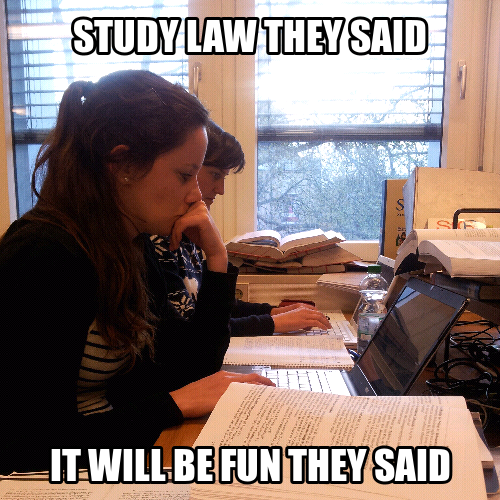Studying law is usually something people aspire to — a glamorous, smart-sounding course that leads to a dashing, high-paying, high-status career.
What they don’t tell you, though, is what one should REALLY expect before putting yourself through that gruelling admission process.
Here are some of the things I wish someone told me before I started:
1. Words take on new meaning.
“Brown”
R v Brown is one of the most mind-boggling cases ever. It involves homosexuals, BDSM stuff more hardcore than Fifty Shades of Grey and the uncomfortably important question of whether you can consent to having harm inflicted on yourself.
The word “brown” (the colour) has never been the same for me after I learned of this English case.
“Reasonable”
The standard definition of the word “reasonable” is to be fair and have sound judgement.
To a law student though, it’s a concept that’s always changing — but from what I’ve learned so far, it’s essentially about letting judges use whatever standards they want in judging.
“Consideration”
To most people, “consideration” means having kindness or thoughtfulness for others.
“Consideration” in the legal sense refers to whatever you are giving in exchange for something promised to you. For example, I will pay $3 to the dessert stall if they serve me a bowl of ice kacang.
It’s said that consideration must be sufficient but need not be adequate, though.
What this means is if you promised to sell me your Porsche for $1, and it’s in a valid contract with us both agreeing, you would be legally obliged to do it, even though $1, obviously, isn’t anywhere near the selling price of your Porsche.
2. You’ll have to read… more than you ever imagined.
Reading essays and cases makes up the bulk of a law student’s workload. Just imagine trying to get through a 80-page judgement written in dense legalese in one go. Even before you get to the actual text, you have to go through a whole list of referenced cases.
The actual text may read like this: “If it is not necessary to prove the offence to have been committed against the consent of those upon whom it was perpetrated, both active and passive participants (if consenting) are equally guilty and both should be prosecuted.” Even the most exciting cases sound dull with this kind of language.
You also pretty much use up a forest's worth of paper with the textbooks and notes you get. Fortunately a lot of text has already been digitised so I don’t have to lug around a huge pile of paper — but it’s still no joke trying to digest all the words you have to absorb.
3. Lectures can be mind-numbingly boring.
Law lectures, unfortunately, are tedious at best and sleep-inducing at worst. In class, people playing with phone games or surfing the net on their laptops are a common sight. Roughly 20 minutes in, you’ll start seeing nodding heads and drool, amid long descriptions of legal concepts and cases.
Eventually, some people simply ponteng the redundant and sluggish lectures and study on their own.
4. You become more argumentative, and feel a greater urge to “talk back" to people.
Ever since starting law school, I’ve come across many aggressive, ambitious and strong-willed fellow students. In that environment, I sometimes feel like I have no choice but to be aggressive in order to get my way.
This “dog-eat-dog world” mentality spills over to life outside school, where you start becoming more nitpicky. Signing up for something? You find yourself poring over the tiny print of the terms and conditions of every. Damn. Thing.
If you’re lucky, you’ll stop, question your behaviour and give up scrutinising it to just sign it. If you aren’t, you’ll even be nagging your friends to study the contracts they have to sign when starting a new phone line.
5. You end up doing a lot more paperwork than any actual arguing in court.
You know those lawyers you see striding confidently into court, slamming the table and interrogating witnesses to tears, a la Suits and The Good Wife? That, if you haven’t already realised, isn’t even half the story.
Most lawyers deal with mountains of paperwork (or stare a lot at their computer screens), and I’m increasingly learning that communicating well with one’s client is more important than out-talking the opposing party.
6. Getting an internship or job is hellishly hard.
There are now more students going overseas to study law in the hope of practicing law in Singapore. Government statistics show that the number of Singaporeans reading law in the United Kingdom has more than doubled to 1,142 in the past five years alone.
With the limited number of law firms in Singapore, the rat race to get an internship or job is intense. I started applying for my summer internship 6 months ahead and wrote to more than 30 firms before receiving my first “yes” — and that was only because someone else who previously had the spot offered to me pulled out earlier.
Snagging an internship may be the first step, but it only gets tougher after that — after all, there’s no guarantee that the firm will go on to hire you and fund your admission to the Bar (which is a process involving taking a 6-month preparation course, passing Part B of the Bar exam, working 6 months as a trainee lawyer and submitting the necessary forms).
As an intern, you are more often than not paid less than $10 a day — if you’re not that lucky, you won’t even be paid at all. The majority of law students find themselves on tenterhooks during their internships because there’s so much pressure to perform well.
And here’s the best part of all…
7. There's no guarantee that you will actually become a lawyer.
With the scarcity of jobs and internships in Singapore-based law firms, some students who study law — particularly those from less famous overseas universities — might find themselves sidelined in the rat race.
After 8 law schools in the UK were removed from the list of approved universities for admission to the Singapore Bar in February this year, students there are now breaking into cold sweat, because even though they aren’t affected, as they are current students who joined prior to the changes, it’ll be hard to deny that their degrees,may be devalued upon their return. Certainly, you could stay overseas and work as a lawyer in the country you graduated in, but there’s no less competition there. Plus, you’ll be a foreigner.
I’ve met Singaporean UK law graduates who returned to find themselves unable to get a training contract — the 6-month law firm apprenticeship that’s a requirement to be recognised as a full-fledged lawyer — after they graduate. They then have no choice but to apply next year (and compete with later batches of law students), or find a job outside of law and try to become a lawyer after getting more work experience. So there isn’t always a straight path to becoming a lawyer.
Although lawyers might get some of the highest starting salaries in Singapore, even the allure of money might not keep them long in this highly stressful profession.
So if you’re in it for the money, and not all that passionate about the work, you may wish to reconsider signing yourself up for the long haul.
Top photo from Tumblr.
If you like what you read, follow us on Facebook and Twitter to get the latest updates.
If you like what you read, follow us on Facebook, Instagram, Twitter and Telegram to get the latest updates.






